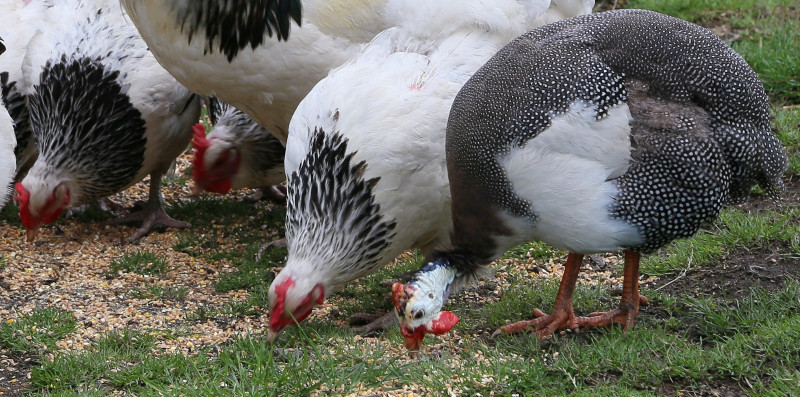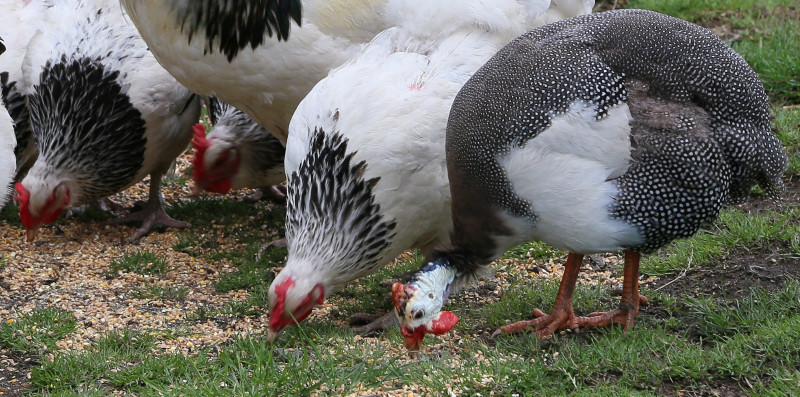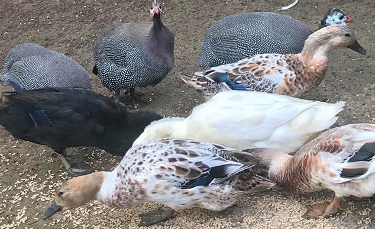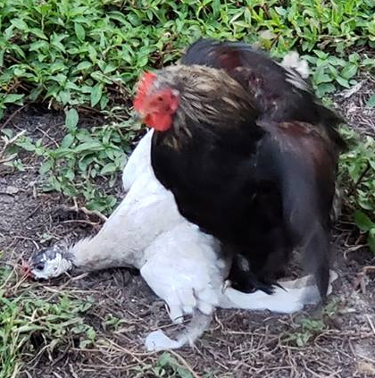Keeping Guinea fowl with chickens and other poultry.

Will Guinea Fowl Get Along With Chickens?
I keep Guineas and chickens together and there are no more squabbles than I would expect from a flock of chickens. My mixed flock has ducks in as well and they get along just fine. I would say that keeping poultry free range makes a big difference here and that confined birds are likely to have more problems.
Guinea fowl are more spontaneous and tend to explode in a flurry of noise and feathers.
Can you keep Guineas with other types of poultry?
Although you can keep female Guineas and hens together as usual it is the males that cause problems, the males of both will fight just as cockerels do and they will try and mate with the hens which can result in sterile hybrids.
Guinea fowl and chickens can and do frequently co-exist reasonably peacefully, but not always .
There are a few things you can do to make sure stuff goes a bit more smoothly. Guineas, the males in particular seem to enjoy harassing the cockerels by tipping their wings up and charging about.
Below: My Guineas and chickens flocking together.

But be aware that Guinea fowl will rule the roost and may bully your chickens although this behaviour is usually much less severe if the Guinea fowl have been raised with chickens and the birds are all free ranging.
Below: Guineas and ducks happily together.

Providing separate coops and runs can offer a good solution too if you have the space and money. I keep my Guineas in house with much higher perches made of tree limbs. They prefer to be higher and the chickens don't mind being up high so there are adaptations you can make to bring some peace to the flock.
Keep roosters and male Guinea fowl separate. I've found keeping Guineas in small numbers is not a problem. They can be kept with other poultry but bear in mind the males will scrap with roosters on odd occasions.
Some Guineas will fight and some are passive.
Will Guinea Fowl Protect Chickens?
Yes, indirectly at least.
Guinea fowl will chase and eat many predators that would otherwise harm your chickens including small snakes, mice and rats, and their fearsome din will often scare off larger predators too.
Guineas are quite fearless when it comes to predators of some types like snakes. Larger predators prefer not to have their position given away and Guineas will let everyone know where the danger is.
Will Guinea fowl and Chickens Cross Breed?
Yes, Guinea fowl and chickens will occasionally cross breed but the resulting offspring is galled a Guin or Guin-hen and will always be sterile.
Below: A rooster mating with a Guinea fowl hen.

The result are called Guin's or Guin-hens and are relatively unpredictable in their habits and whether or not they actually lay eggs. They are always sterile.
Will Guinea Fowl Eat Chicken Feed?
Yes, you can feed them the same kinds of food as you do your chickens but if your Guinea fowl are ranging freely you won’t need to give them so much.
This is all about feeding Guineas and what to treat them with.
Do they scratch like chickens?
No, flocks of Guinea fowl do not scratch up the ground like chickens do. I would call it rummaging about as opposed to scratching. They do dust bath and will do so alongside chickens.
They spend most of their day looking in all sorts or nooks and crannies looking for food. If they need to scratch something up they will but they do not scratch big holes in the ground like chickens do.
They will have a dust bath wherever they want and If the ideal spot is in your flower bed then that is where they will have a dust bath.
Can I mix Guinea fowl hatching eggs with other types?
You should not mix eggs in the incubator or under a hen, even duck or turkey eggs that have a similar incubation times to Guineas should not be hatched together.
The incubation period can be as long as 28 days , similar to turkeys but in practice hatching can be anything from 25 to 30 days. They hatch like a jack in the box and start hurdling around the incubator immediately.
Different eggs from different breeds require different conditions in the incubator and although you can mix them it is not advisable.
Can you mix chicks and keets together?
There is no reason you can't raise chicks and keets together except for the fact the should really have different feeds. Keets require a much higher protein starter feed then young chickens and you will either be giving the keets less protein than they need or the chicks much more protein than they need.
I have raised chicks and keets with a broody hen before and it worked just fine but it may not always.
I would always try to raise chicks and keets in separate batches even if you are using the same equipment.
Keets are more hardy than chicks and seem to shy away from heat in week or so prefer to return to a warm spot rather be in a warm area. It is best to give them the same conditions in the brooder as you would chicks.
They young Guineas really require turkey starter ration as it has a higher protein. We keep ours in a plastic storage container (large tote) as it has solid sides, to start as they can get through surprisingly small holes and can jump like fleas. They feather up quickly but in an odd fashion, seemingly growing a large overcoat that covers them from the shoulders and hangs over the tail.
Keets can be hatched and raised under a broody guinea or hen( 18 eggs ) with a hen probably being the best method as they teach them to roost etc. and behave like chickens.
The guineas have a habit of leading the keets through long grass early in the morning , getting them wet and letting hypothermia kill them. They also have a habit of getting of the nest early with just 4 or 5 keets and abandoning the remaining eggs.
My preference is to raise guinea keets under broody hens as then they learn to roost in coops and to behave more like hens which has many advantages.
They are susceptible to some of the same diseases and parasites and hens but probably have more in common with turkeys including a tendency to blackhead.
